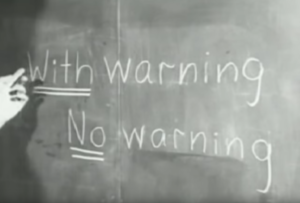
I hope you’ve read the recent articles about Cambridge Analytica, the secretive data-mining and -laundering firm that used data illicitly extracted from millions of Facebook profiles to microtarget American voters, and ultimately interfere in the 2016 US presidential election. I learned a lot the other day, including a troubling new-to-me phrase: ‘information operations’. Information as a cyberweapon, against which the public has little to no defence. In many cases, individuals have no idea that they have been targeted at all.
Reminds me of the story of when a group of students were asked "What's the most valuable currency in the world?".
The answers came back… "gold? dollars? platinum?".
"No" replied the teacher. "It's information"
— Ian Furniss ??????#FBPE?????? (@ianfurniss) March 17, 2018
I look at this news as an ‘information professional’, long on morals and short on pay, and I despair. We are powerless against information mercenaries who will acquire personal data by any means and sell it to anyone. We are pawns in international cyber-wargames. How can we possibly arm people against threats like this? How are we defending our communities against this onslaught?
Our profession relies on the goodwill of people, chiefly middle-aged white women, who just want a comfortable job and a secure income. Fighting is a risk few librarians are prepared to take. Fewer still are adequately prepared. How often have you heard people say ‘ooh, I’d like a nice quiet library job’? Who wants a flaming argument at the reference desk with someone neck-deep in their News Feed? How many of us have shared inflammatory content on social media, unaware of how it came to us in the first place? Who among us knows where our patron data is going? (Hint: it’s going to Big Vendor, and we’re not calling them out on it)
What can we do? What good are our morals if we have no impact?
The March/April issue of ALIA’s member magazine InCite is themed ‘Libraries in the post truth society’. The day before deadline, I decided to write a short piece. That’s me on page 24. I’m surprised it was published, to be honest. I don’t think it’s my best work. But it’s also the most optimistic take I could possibly come up with (and believe me, I tried!). InCite readers want optimism, positivity, progress. They don’t want to hear about the slow disintegration of civic society and the planet at large. They don’t want to know how much Facebook has on them. They don’t think about the nature of their library’s relationship with their vendors. It’s not going to help them get through the day.
We seem to want it both ways. We painstakingly teach fake news detection strategies to people who aren’t listening. We want people to trust us. Yet we’re still buying (crappy) library software from commercial entities that naturally place profit above privacy. We’re still using Facebook to promote our libraries, even as we discover what happens to the data of Facebook users. Personally, I quite like the idea of a profession with an inbuilt set of morals and ethics. (I know there are varying views on this.) But we certainly don’t always act in ethical ways.
Librarianship is not innocent. We are complicit in the takeup of unequal systems and unethical practices. The sooner we all take a good hard look at ourselves, our society, and the Delete button on our workplace Facebook accounts, the better. We cannot hope to defend—and change—a world we don’t understand.